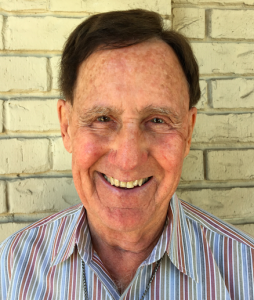Engineer / Corporate Manager / Entrepreneur
Mentor, Tom Naugle
 Tom’s business career is a good example of what you can achieve with hard work, persistence and the ability to motivate and manage people. Tom paid for his education himself and started working to save for college while he was in high school and then continued to work during the summers while he was getting his BS in Chemical Engineering at Oklahoma State. After graduating, Tom began his business career as an engineer working for two chemical companies before a mentor encouraged him to apply to Harvard Business School and get an MBA. That degree opened the door to a position with Cooper Industries where he first worked in the corporate planning department and then went on to manage several of their divisions. He successfully turned around one failing business and improved the profitability of others before he was recruited to come to Tulsa as the President and CEO of a drilling rig and oil field equipment manufacturer.
Tom’s business career is a good example of what you can achieve with hard work, persistence and the ability to motivate and manage people. Tom paid for his education himself and started working to save for college while he was in high school and then continued to work during the summers while he was getting his BS in Chemical Engineering at Oklahoma State. After graduating, Tom began his business career as an engineer working for two chemical companies before a mentor encouraged him to apply to Harvard Business School and get an MBA. That degree opened the door to a position with Cooper Industries where he first worked in the corporate planning department and then went on to manage several of their divisions. He successfully turned around one failing business and improved the profitability of others before he was recruited to come to Tulsa as the President and CEO of a drilling rig and oil field equipment manufacturer.
After fifteen years as a corporate manager, Tom decided to leave corporate life and look for businesses to buy for himself. He first acquired a company that manufactured truck trailers and then one that made electrical winches. He sold his interests in these businesses after twelve years and then became a venture capitalist. During that time, he and some other partners acquired AAON, which was then the division of a privately held company that manufactured commercial air conditioners. They expanded the business and later took the company public.
Those of you want to become a corporate manager or an entrepreneur and own your own business will be interested in reading how Tom managed his companies and motivated his employees and his comments on the value of an engineering degree and a MBA.
My Career Path
I grew up in small, rural town in Oklahoma with a population of about a thousand people and was blessed with parents who were hard working folks. My parents never graduated from college and encouraged me to go. But they made it clear they could not pay my expenses. I knew I had to earn the money myself and began working to save for college when I was fourteen. My father ran a chicken hatchery and at the beginning of January we would buy fertilized egg. I would work Saturdays and Sundays and put the eggs in racks and then in the incubator. Three weeks later after the chicks hatched, we would sell the day old chicks to poultry farmers along with feed and chicken medicine during the rest of the year. My father also owned two wheat combines; his brother owned two and his brother’s son-in-law had one. After the season for chicken incubation was over in the spring, they would begin harvesting wheat in Texas and follow the harvest all the way to North Dakota. I starting going with him when I was fourteen and drove a combine all Summer.
My parents told me that after college I should do something that had job security and a pension. Never mind what you were doing all day long. Two of my friends who were going to OSU got together with me and talked about what our major should be. When you grow up in a small town you are not exposed to lot of career possibilities. You know what a farmer and gas station owner does but there were not many people to talk to who had a college degree. After doing some research, we all agreed that engineers made the most money and all three of us enrolled in chemical engineering. I did get one scholarship and my parents gave me five dollars a week and did my laundry. But the rest was up to me.
When I graduated with my BS in Chemical Engineering, I knew that I did not want to be the kind of engineer who spent their time at a drafting board. Instead, I looked for a job where I could be involved in operations and took a position at Union Carbide in Texas. It was the lowest paying job offer I got. But I was out in the chemical plant and involved in the day-to-day operations rather than sitting at a desk. My wife became homesick living in Texas and wanted to move back to Oklahoma. So after a little more than a year, I got a job in Tulsa at the Skelly Oil Company. There I was doing economic analysis of projects using computer programs where you could model a refinery and determine how different variables affected the cost of the chemical products. But I got bored after a couple years and wanted a more challenging job. During that time, I met someone with a Harvard MBA who became my mentor. He encouraged me to get a Harvard MBA myself and told me it would open doors to more and better career opportunities for me. He helped me apply and I was accepted.
The Harvard MBA program is known for using case studies as its teaching method. Because these studies involved practical problem solving, Harvard liked to have some of the students in their MBA program that had work experience, which was one of the reasons I believe I was accepted. Rather than classroom lectures, class time was spent trying to solve the business management problems presented by the professors in case studies. At no point would the professor ever give you the answer. Instead, there would be a discussion about how to solve a particular business problem and the different possible solutions. One person would first be called on to speak and offer their solution and the rest would discuss their own solution. You got points if you could show the first person where they were wrong. Every business problem we analyzed was based on a real and not a hypothetical situation. We would get three case studies a day with each being about forty pages long. To read all these case studies, then analyze them and work out the numbers took a lot of time for me in part because I was a slow reader. So I didn’t sleep much during the two years I was at Harvard. I paid my tuition and living expenses by selling my new Pontiac and buying and old, beat up Dodge, getting a scholarship and borrowing a little money. My wife also worked and we lived very frugally for two years. But the rewards were worth it.
I had good grades at Harvard and was able to get a job in the planning area of a large manufacturing company, Coopers Industries. After I was there a little over a year, I got my first opportunity to manage one of their small divisions. It was not profitable and they wanted to sell it but they didn’t want to lose the manager. So they decided to send me to run it, someone they were not too concerned about losing. I went to Pennsylvania as President of the Pump and Compressor business and turned the division around. That allowed me to move to a bigger division in Houston where I worked for two years before I was promoted to Vice President of Corporate Planning for the parent company. I stayed in that position for three years then went to Ohio as President of Cooper Energy Services where I was able to also increase sales and profitability. After five years, Cooper decided to move me back to Houston where I was Senior Vice President of their Compressor and Petroleum Equipment division, one of the company’s largest manufacturing operations. While I was in Houston, I was recruited to come to Tulsa in 1980 as President and CEO of Cooper Manufacturing, a company with the same Cooper name but that was not affiliated with Cooper Industries, that built drilling rigs and associated equipment. The price of oil jumped and we were selling equipment as fast as we could get it out. When the oil markets turned down, I had to cut back on staff and decide that I would also leave the company. I had a good termination package and left with enough money to be able to look at acquiring a business for myself.
After a year and a half of searching, I found a company in Oklahoma City, Barrett Trailer, where the owner was ready to retire. I was able to put together a deal with the help of a Houston banker I knew from my Cooper days. Shortly after I acquired Barrett, five of the key managers in manufacturing, engineering and marketing all left and decided to go out and start their own competing company. But it turned out the people who stepped in and filled their positions did a better job than the people who had left. We were able to produce the same kinds of products as our new competitor and sell them at a lower cost than the group who had left could offer their customers. So we were able to keep them from chipping away at our market and were able to grow Barrett and make some money.
A few years later, I had the opportunity to buy Tulsa Winch, a product line owned by the Vickers Corporation. I was in competition with two guys who were also trying to buy it. We decided to become partners and acquire the company together. They knew the product line and how to manufacture it and I had the money and the experience doing acquisitions with these kinds of large corporations. We ran it for ten years and then sold Tulsa Winch to the Dover Corporation. One of my partners stayed with the company and eventually rose in the ranks to become CEO of Dover with a salary of several million dollars.
After I sold Tulsa Winch and Barrett, I then went into the venture capital business. One of the best deals I did was being an investor in the acquisition of AAON, the commercial air conditioning line of a local, privately held company. The management was able to expand sales and we eventually took the company public. Although on balance I made money as a venture investor, like most other venture capitalists I also lost money on several investments.
I have has always tried to give back to the community and have been involved in helping young people. Besides just making donations, I also give my time and am on the Board of the Tulsa Boy’s Home and have helped the founder of Aim High, Jennifer Patterson, build a program where underprivileged children begin gymnastics when they are only two or three. Gymnastics is a disciplined sport that gives these young people the confidence to see they can achieve things they might have thought were impossible. This early intervention is proving to be an effective way to break the cycle of poverty in poor communities by building confidence in these young children that they can succeed, something they will carry throughout their lives.
Managing Your Employees
I found out from my own work experience that an employee who is not happy can do a lot of harm and you will never know it. As an example, when I was trying to turn around one of Cooper’s divisions, I was not the one who negotiated the contract with my union employees. Someone from corporate did that. But I did find out who was the unofficial leader of the people on the floor and I took him out to dinner. I asked him what we could do to make the company’s manufacturing run better. He said that I could fire a young engineer who thought that engineers were superior to floor workers out in shop. I did it and productivity immediately improved. That move let the people on the floor know that we respected and cared about them.
One of the keys to success for Tulsa Winch was how we were able to motivate our employees. By the fourth year, we knew we were going to make it and we decided to pay bonuses. My partners and I came up with the idea that we would pay the bonuses like they did for Super Bowl players where the same amount of money was paid to everyone on the team. So the guy sweeping the floor got the same bonus as someone in the office. It created the feeling that everyone was important. This team spirit helped us grow our market share. For example, we had a customer come to us and say they needed winches produced quickly so they could ship five cranes by the end of the year or they wouldn’t get their bonuses. They told us that our competition said they couldn’t make delivery on time and wanted to know what we could do. We went out in the shop and asked the guys if we could get it done and they all said sure. With everyone working together, we did manage to get them all shipped on time. The people at the crane company were able to get their bonuses and you can guess who they bought from the next time. That kind of good service happened time and time again because our people worked together as a team and we worked hard to make the employees feel important. I think my awareness of the value of treating employees well came from the fact that I was from a small town and knew it was important that people were treated with respect.
Some Other Thoughts
Engineering is a good subject to study even if your goal is to go into management. When I was hired at Coopers, my boss had an accounting background but was looking for people who had an engineering degree and a MBA. He thought that engineers were trained to solve problems and better able to narrow down a business problem than people who just had degrees from a business school or an accounting background like he had.
But accounting is also important to for any manager to understand. For example, I always studied the Profit and Loss Statements. I had a checklist of things to think about on the P&L and used it to do a lot of analysis and planning especially as it relates to product pricing. I would often do a simulation to understand what would happen if I did something like raise the price of a part by 10% and the impact that would have on overall profits or how an increase in the cost of our components would affect our margins.
It is also important that you have integrity and can convey to your employees, customers and owners they can count on your word. When I became a venture capitalist and was investing in businesses, trying to find ways to measure a person’s integrity was always one of my first considerations.
Summary
The success that I had was in large part because I worked hard and was open to new opportunities that presented themselves during my career. While my parents told me to look for job security and not worry about what I was doing all day, I knew that I didn’t want to sit at a desk and I pursued a career that allowed me to get out and interact with people and one that also involved taking some risks.
Owning your own business can be rewarding. You have more control than if you are trying to build a corporate career. But it is more challenging when you are making most of the important business decisions yourself. You also have to learn to listen to your employees and understand their point of view. Being a business owner means you will have to invest a lot of your own money even if you get a venture capitalist to participate. You should expect to have most of your net worth on the line when you start that first business venture. But if you have a passion for what you are doing and prepare yourself well, owning your own successful business and building a business team can be one of the most personally and financially rewarding things you can do in your life.






